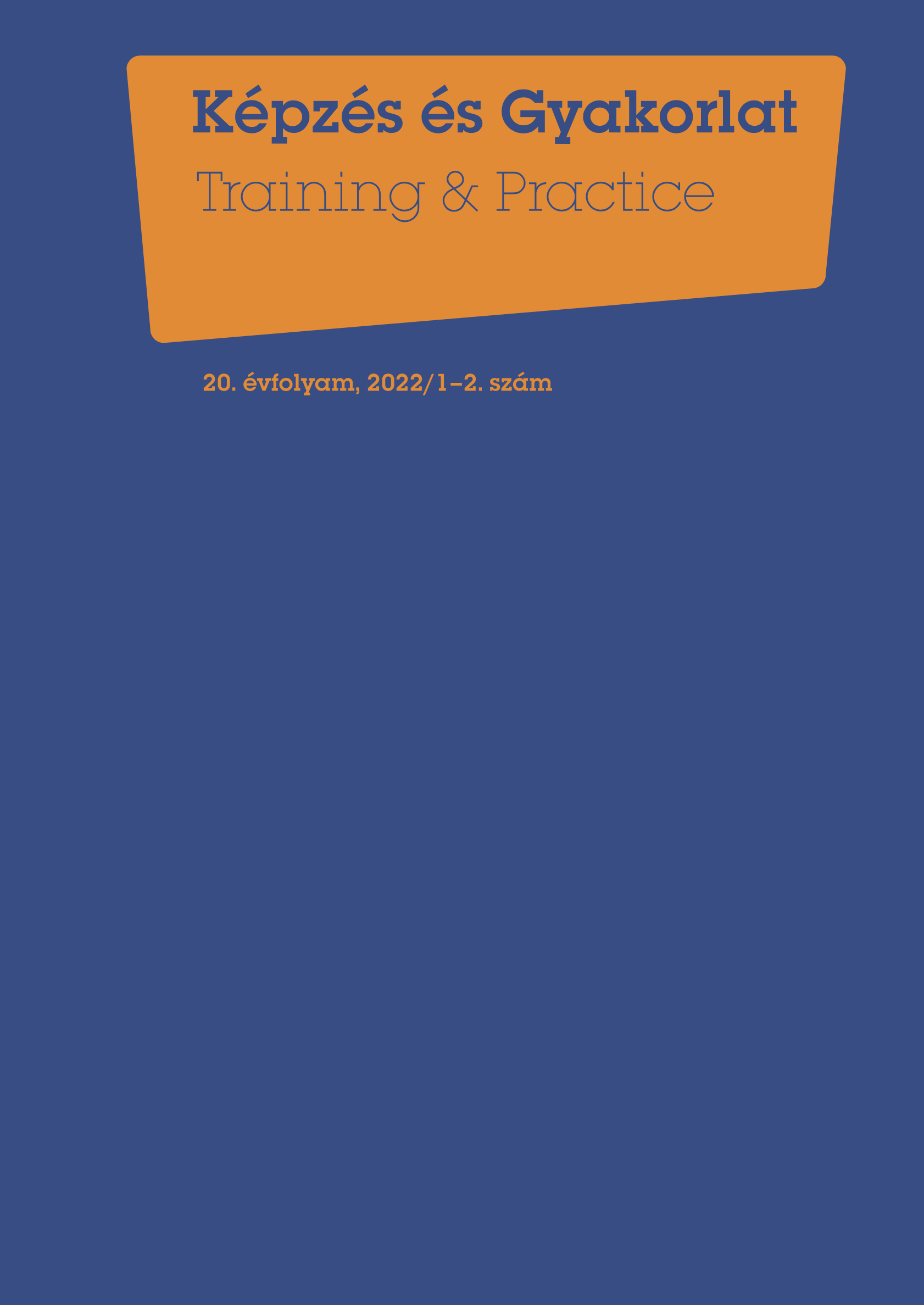(The Lack of) International and Hungarian Digital Materials in the Field of Health Education – A Comparative Study
DOI:
https://doi.org/10.17165/TP.2022.1-2.1Abstract
The epidemic situation caused by the SARS-CoV-2 virus has highlighted the importance of dig-ital teaching aids and experience indicates that the availability of teaching materials in Hun- garian is decreasing, while the demand for their usability is increasing (European Commission, 2020a, European Union, 2020). One in five young people lacks basic digital skills (European Commission, 2020a). In our digital age, it is essential that existing technology and digital tools are used for education and training purposes and that high-quality training is provided to fill any infrastructure gaps (European Union, 2020; European Commission, 2020a, European Commission, 2020b). There is potential for the inclusion of authentic digital materials to enhance the effectiveness of teaching and learning, but in some subject areas there is a lack of online resources. In addition to the lack of tools, the digital skills and competences of teachers and learners need to be improved. Despite the epidemiological situation, the development of health literacy has continued, but the use and application of digital teaching materials/assistance have been a challenge for teachers. The aim of our study is to analyse the availability of online teaching aids and thus their applicability at national and international levels. In our research, we present the availability and applicability of digital health literacy materials in English and Hungarian available in autumn 2020 and August 2021. Our results show that the number of available Hungarian language aids at the beginning and in the middle of the epidemic was significantly lower compared to English language ones, while the number of English language aids was continuously updated, and fresh data, information and aids were published in English, while in Hungarian it was less frequent, and the number of available materials even decreased.
References
Adorján B. (2020). A digitális oktatás tapasztalatai a COVID-19 járvány idején. Képzés és Gyakorlat, 18. évf. 3-4. sz. pp. 213–226. DOI: https://doi.org/10.17165/TP.2020.3–4.22
Európai Bizottság (2020a). EPALE: Digitális készségek a felnőttkorban (2020). [online] https://epale.ec.europa.eu/hu/private/digitalis-keszsegek-felnottkorban-2020 [2022.11.11.]
Európai Bizottság (2020b). Oktatás és képzés. Digitális oktatási cselekvési terv (2021–2027). [online] https://ec.europa.eu/education/education-in-the-eu/digital-education-action-plan_hu [2022.11.11.]
Európai Bizottság (2020c). Oktatás és képzés. Koronavírus: online oktatási segédanyagok. Online segédanyagok és eszközök tanulóknak, tanároknak, oktatóknak a Covid19-járvány idejére. [online] https://ec.europa.eu/education/resources-and-tools/coronavirus-online-learning-resources_hu [2022.11.11.]
European Union (2020). Digital Education Action Plan 2021-2027. Resetting education and training for digital age. [online] https://ec.europa.eu/education/sites/education/files/docu-ment-library-docs/deap-communication-sept2020_en.pdf [2022.11.11.]
Grand-Clement, S., Devaux, A., Belanger, J., Manville, C. (2017). Digital learning Education and skills in the digital age. RAND Corporation. In: Conference Proceedings : RAND con- ference proceedings present a collection of papers delivered at a conference or a summary of the conference 2022. DOI: https://doi.org/10.7249/CF369
Huawei Technologies Hungary (2020). A diákok tizede örökre online maradna suliba járás helyett. [online] https://www.technokrata.hu/egazdasag/digitalis_oktatas/2020/05/01/dia-kok-tizede-orokre-online-maradna-suliba-jaras-helyett/#_ftn1 [2022.03.13.]
Józsa, G., Karáné Miklós, N., Józsa, K. (2021). Pedagógusok tapasztalatai a tanulók motiválá- sáról a Covid19 járvány idején. Gyermeknevelés, 9. évf. 2. sz. pp. 169–186. DOI: https://doi.org/10.31074/gyntf.2021.2.169.186 Koronavírus Honlap. https://koronavirus.gov.hu [2022.11.11.]
Papp-Zipernovszky, O., Náfrádi, L., Peter J. Schulz, Csabai, M (2016). „Hogy minden beteg megértse!” – Az egészségműveltség (health literacy) mérése Magyarországon. Orvosi hetilap, 157. évf. 23. sz. pp. 905–915. DOI: https://doi.org/10.1556/650.2016.30498
Schulz, P. J., Nakamoto, K. (2005). Emerging themes in health literacy. Stud. Commun. Sci., Vol. 5 No. 2. pp. 1–10.
Shaojuan Hu, Lorelei Tucker, Chongyun Wu, Luodan Yang (2020). Beneficial effects of phy- sical activity on mental health in older adults during the COVID-19 pandemic. . Psychiatry, 11:587557, DOI: https://doi.org/10.3389/fpsyt.2020.587557
Szabó, B., Kíves, Zs., Máté, O., Polyák, É., Pusztafalvi, H. (2021) Prosztatarákkal diagnosz-tizált betegek egészségmagatartásának vizsgálata. Orvosi Hetilap, 162. évf. 10. sz. pp. 383–391. DOI: https://doi.org/10.1556/650.2021.31956
Végh, V., Soltész-Várhelyi, K., Pusztafalvi, H. (2021a) Általános iskolai pedagógusok attitűdjeinek mintázatai a koronavírus járvány következtében bevezetett digitális oktatási rend első hulláma alatt. In: Buda, A., Molnár, Gy. (2021, szerk.) Oktatás-Informatika-Pedagógia 2021. Debrecen, Debreceni Egyetem Nevelés- és Művelődéstudományi Intézet.
Végh, V., Soltész-Várhelyi, K. Pusztafalvi, H. (2021b) Which Attitude Helped The Academics to Overcome The Difficulties of Online Education During Covid -19? In: Enakshi, Sengupta; Patrick, Blessinger (szerk.) New Student Literacies amid COVID-19: International Case Studies. Bingley: Emerald Group Publishing (pp. 153–168.) DOI: https://doi.org/10.1108/S2055-364120210000041019
World Health Organization (2020a). Alternatives to handshakes, hugs and high fives during COVID-19. [online] https://www.facebook.com/WHO/videos/967761850383660 [2022. 11.11.]
World Health Organization (2020b). When and how children should wear a mask.: [online] https://www.youtube.com/watch?v=g11wOz6I8fg [2022.11.11.]
World Health Organization (2020c). Will you wash your hands with Akili? [online] https://www.youtube.com/watch?v=ogJUASq5Gv0 [2022.11.11.]
World Health Organization (2022). Watch videos. [online] https://www.facebook.com/WHO/videos/?ref=page_internal [2022. 11. 11.]
Downloads
Published
Issue
Section
License
Copyright (c) 2022 Dinnyés Katalin Julianna, Pusztafalvi Henriette

This work is licensed under a Creative Commons Attribution-NonCommercial-NoDerivatives 4.0 International License.












